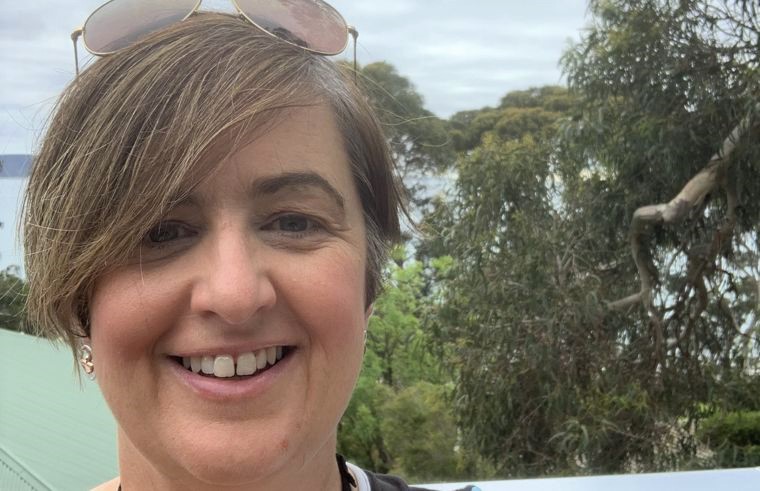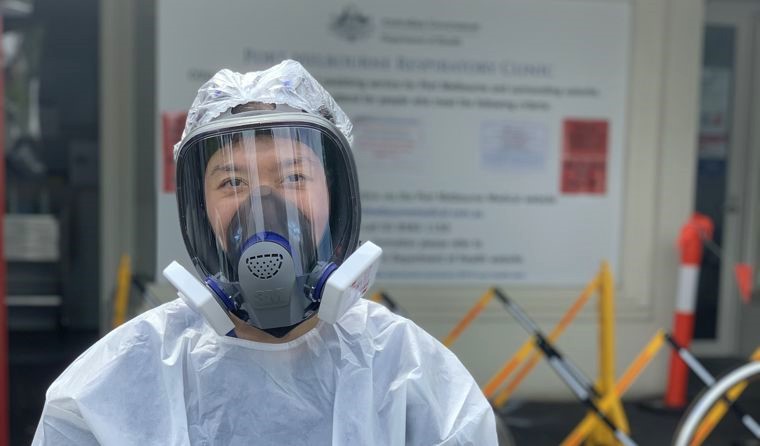Feature
What’s it like working at a COVID respiratory clinic?
newsGP speaks to two GPs about the joys and challenges of working on the pandemic frontline.
 GPs have worked at COVID testing clinics throughout the pandemic.
GPs have worked at COVID testing clinics throughout the pandemic.
The ins and outs of working in a COVID-19 respiratory clinic might come as a surprise to some.
newsGP spoke with two GPs about the joys and challenges of working on the pandemic frontline.
Dr Bernadette O’Connor, Prahran Respiratory Clinic
When Dr O’Connor heard there was a job opening for a GP to help establish and then work at a COVID respiratory clinic in the inner-Melbourne suburb of Prahran in March, she leapt at the opportunity.
The GP from Ireland had recently finished a job and was planning to return home and do some locum work – then the pandemic struck.
Dr O’Connor told newsGP she realised she could no longer make it back to Ireland and was worried about being unemployed.
Her initial feeling about working at a COVID clinic was therefore one of relief.
‘Because I was like, “Oh, I have a job”,’ she said.
Dr O’Connor’s partner did not share her enthusiasm, however, and was instead ‘a bit daunted’ by the idea. He was especially concerned about the risk of Dr O’Connor potentially bringing COVID-19 home to two children.
Dr O’Connor was also met with concern from colleagues and practice managers when she told them of her plans.
‘I felt there was a bit of misconception from practice managers,’ she said.
After she accepted the position at the COVID clinic, Dr O’Connor was told she could not return to the general practice at which she used to work because they were concerned about the risk of cross-contamination.
‘I was a bit put out about that,’ she said.
Though other people were worried about her safety, Dr O’Connor did not share these feelings of apprehension. In fact, she has felt completely safe and protected since the day she first started working at the COVID clinic.
‘The biggest thing people are probably concerned about is safety, but I never felt that was an issue,’ she said. ‘Even throughout the whole time, from an infection point of view, it’s the place I’ve felt most protected.
‘I’ve been a lot more concerned about contracting COVID from the supermarket, rather than the clinic.’

Dr Bernadette O’Connor feels safer working at a COVID clinic in Melbourne than she does going to a supermarket.
As the pandemic began to escalate worldwide, Dr O’Connor started to find solace in her work.
‘It was actually really good because it was a definite structure,’ she said.
‘General practice was kind of chaotic and guidelines were constantly changing, whereas I went into the clinic and everything was organised and we knew how things were going to run.
‘Another huge factor for reassurance was that there was always a plentiful supply of PPE [personal protective equipment], which does not seem to be the case worldwide.’
But that feeling changed somewhat when Melbourne went into its second lockdown in July.
‘When it reached its peak, things got really busy,’ Dr O’Connor said.
Dr O’Connor was working three to four days in the COVID clinic at the time. She was also the clinician responsible for giving results to positive cases.
‘That was quite intense,’ Dr O’Connor said.
‘It got quite stressful in the peak in July and August and you felt like you weren’t getting away from it because seven days a week you were ringing people telling them they had COVID.’
Dr O’Connor was also involved in telling families in the Melbourne public housing towers that went into ‘hard lockdown’ in July that they had tested positive for COVID.
‘That was probably the roughest part of all of it,’ she said.
Dr O’Connor was particularly moved by the plight of these patients. She recalls ringing a mother in one of the towers to tell her she had tested positive for COVID.
‘And she had a young baby and all of a sudden she couldn’t even get milk and basic supplies for the baby,’ Dr O’Connor said. ‘She told me when her friend pleaded with the security guard to leave supplies for her, the security told her to give the baby water.’
‘There was a non-English-speaking couple that I disclosed the diagnosis to, and they became quite hysterical.’
The husband had deteriorated with increasing shortness of breath since being tested, and the couple was unsure of how to seek further help or support. The couple had not been in Australia for long and did not have a regular GP.
‘We had to organise an ambulance for him, and tried to arrange some emotional support for his wife,’ she said.
‘All that was pretty stressful.’
Those experiences really highlighted the social impacts of COVID-19 for Dr O’Connor, although she states that it was not necessarily the medical aspect that affected her.
‘[Instead,] it was the realisation that people who didn’t have established healthcare networks and didn’t have their own GP and didn’t know what to do [when diagnosed] were most affected by the pandemic,’ she said.
Dr O’Connor does not find working in a COVID clinic itself distressing, however.
‘It’s a very non-stressful job, it’s pretty straightforward work,’ she said.
‘It’s not hugely challenging from a medical, GP perspective. It’s quite repetitive.’
For her, most of the work involves screening patients, performing minimal physical examinations, calling patients with results and offering advice about what it means to be a close contact, and so on.
In fact, Dr O’Connor says working in the clinic has made her miss the diversity of day-to-day general practice. She also misses the ease of not having to wear PPE at work.
At the COVID clinic, Dr O’Connor is in PPE from 9.00 am to 5.00 pm, minus one hour for lunch.
‘I think the biggest thing is you don’t drink as much as you would ordinarily because you can’t really go to the bathroom, and if you do, you have to doff off and go out and come back in again,’ she said.
‘The N95 masks were quite hardcore on the face, on your cheeks and nose and stuff, and if it’s really hot it can get a bit sticky.’
While Dr O’Connor did not actively seek work in a COVID clinic during the pandemic per se, she is grateful for the experience.
‘I do feel quite privileged,’ she said.
Dr O’Connor feels ‘valued’ by the community and is often taken aback by how frequently patients thank her for doing her job. She also feels grateful to be ‘part of the journey in a very unique way’.
‘This is really historic and we’re working on the frontline,’ she said.
‘Feeling like you are part of the story of what’s happening; I feel a bit lucky to have been part of it.’
Dr O’Connor feels these sentiments should be shared by all GPs who have worked throughout this time.
‘This is a public health drama and emergency more than a hospital drama and emergency,’ she said.
‘It’s not so much about the ICU beds and the ventilators, that’s become quite clear.
‘Instead, it’s about patient education of the basics around handwashing, social distancing, limiting social contacts, and so on.
‘For the first time in my career, I’ve seen that public health measures – which is what we do as GPs every day – is as important in combatting this global pandemic as it is being an intensivist managing the critically ill.’
Dr Sue Zhang, Port Melbourne Respiratory Clinic
Dr Zhang never imagined her first job as a GP Fellow would involve working at a COVID respiratory clinic during a pandemic.
‘But then, right smack bang as soon as I finished [general practice] training, out of nowhere came COVID,’ she told newsGP.
Dr Zhang was already due to start her first job as a Fellow at Port Melbourne Medical Clinic.
Dr Zhang’s interest was piqued when that clinic opened a GP-led respiratory COVID clinic in April – but she harboured reservations.
‘I did consider whether I would be putting my family at a higher risk because I do live with my parents,’ she told newsGP.
Knowing her parents are both healthy did not entirely allay her fears.
‘Just knowing that older people in general do have a higher risk of complications of COVID worried me,’ she said.
‘I was thinking about whether we would have to change our living arrangements if things really got out of control to reduce that exposure [risk] for my parents and family.’

Before working at a COVID respiratory clinic, Dr Sue Zhang was concerned about putting her elderly parents at risk.
But Dr Zhang ended up biting the bullet and started working at the COVID clinic in May.
She initially adapted to the work easily and her fear levels dropped.
‘Then, when we were really just ramping up during the second wave, [some positive cases] started to trickle through this clinic,’ she said.
‘And then just seeing more and more numbers return back as positive through the clinic, that’s when it was a new sense of that risk and that worry.’
Despite that worry, Dr Zhang never contemplated walking away from her role. She says she feels very supported by her clinic and protected wearing PPE.
That PPE included an N95 or P2 mask earlier in the pandemic.
‘But now we’ve upgraded to those elastomeric P3 respirators,’ she said.
Dr Zhang generally sees six to seven patients an hour at the COVID clinic.
Presentations range in seriousness ‘from minor coughs and colds where the patient themselves is not concerned about their symptoms’, through to immunocompromised people and complex older patients.
Complicated patients can get very stressful.
‘You’re trying to work out what might be the cause of their new symptom, trying to triage things, work out what’s the next thing that we need to do – [all] without a handover,’ Dr Zhang said.
‘Usually you don’t have a handover from their [regular] GP and trying to make that decision in 10–15 minutes can sometimes be where it’s a bit more stressful.’
Despite these stresses, Dr Zhang is grateful for the existence of COVID respiratory clinics.
‘I understand that a lot of other practices don’t have the equipment and support that this clinic has, so I feel very grateful that we can work in a safe environment and to be those hands, or be able to examine patients for other GPs,’ she said.
‘I would hope that general practitioners around Melbourne don’t feel like they have to put their own health at risk by seeing cold virus cases if they don’t have the PPE.
‘I think it’s just an important service to have in the coming weeks and months as things are opening up and just trying to make sure that we don’t get that third wave happening.’
For now, Dr Zhang plans to continue working at both the COVID respiratory clinic and seeing regular patients at Port Melbourne Medical Clinic.
While it’s not how she envisioned getting started, Dr Zhang is grateful she was able to launch her medical career by working on the pandemic frontline.
‘Absolutely, I feel lucky,’ she said.
‘It’s definitely different, and I really appreciate the variety.’
Log in below to join the conversation.
COVID-19 pandemic respiratory clinic
newsGP weekly poll
As a GP, would you benefit from further education about identifying and supporting patients impacted by intimate partner violence?